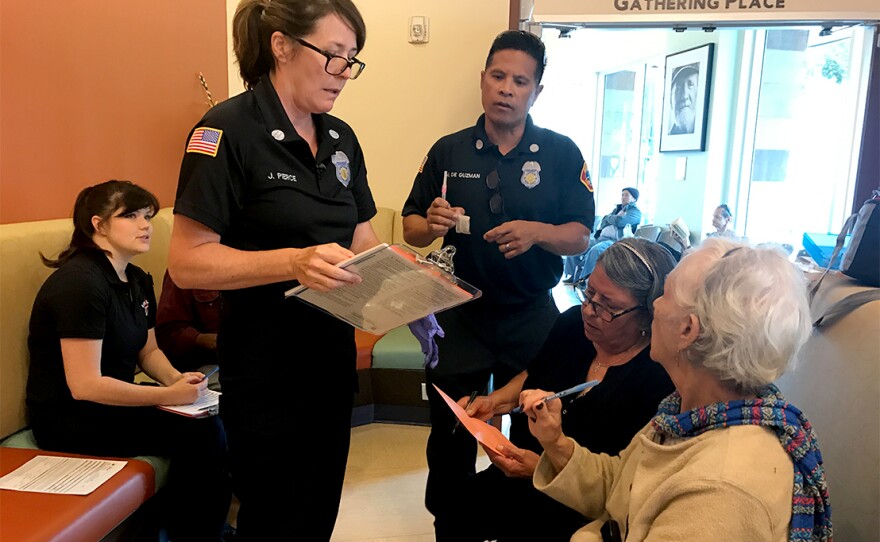>>> I'm Maureen Cavanaugh in its Wednesday, January 24. Our top story, months of efforts by San Diego County and city health workers to combat the hepatitis A outbreak seems to have paid off. The County Board of Supervisors Tuesday ended the have a emergency health declaration after four weeks without new cases. The death toll from the outbreak stands at 20 with more than 500 confirmed cases since late 2016. The end of the emergency does not mean to have a outbreak is completely over, meanwhile San Diego health officials are dealing with a widespread and deadly flu outbreak. Joining me a San Diego County public health officer Dr. Wilma, welcome back. >> Good morning. >> The state of emergency was first declared in part to draw more attention to the outbreak. What does it mean that the emergency is now over? >> Now that the emergency -- the emergency means that those efforts and all of that focused attention is no longer needed. And we can manage the number of sporadic cases that we make it. But it does not mean that our strategic approach are ending. We will continue to vaccinate, we will continue to sanitize municipalities such as the city of San Diego, and will continue -- we will continue to clean and sanitize streets. We will also continue as a County to provide education to community partners that want to get more information about hepatitis A. >> There are about four suspected hep A cases under investigation right? >> Yes as of yesterday. Things change daily so we can have more. But as of yesterday we made the presentation we had for suspect cases. >> -- And that is in addition to the 577 confirmed or probable cases that we reported. >> County health Dr. said yesterday we could be facing a new normal for hepatitis. What does that mean? >> Will that means that now because the strain of hepatitis A is in our community we could see sporadic cases related specifically to the genotype 1B, that was the type responsible for the outbreak, the non-outbreak cases are usually one a and their travel associated. That is what it means that the new normal will now include a sporadic case here or there of the genotype 1B hepatitis A virus. >> The county spent $10 million on its efforts to stop the hep A outbreak, if this one of the biggest public health efforts you have seen? >> It is, this is the first hepatitis A outbreak that we have seen in the homeless and illicit drug users that is spread through close, person-to-person contact. Previous outbreaks were food related. And once you remove that source, you remove the opportunity for continued spread of the infection. >> You mentioned that even though the health emergency has been lifted, the anti-hepatitis A efforts from the county will be continuing. You said the vaccinations will continue, what other -- this and include hand washing stations and other things the county implemented?, For hand washing stations, specifically we did an assessment in late December on the utility of it. >> We stratified the utility of it for low moderate and high use. 57 of the 160 stations were in use. This continued -- we will discontinue those stations as of the end of this month. And then we will glide slope and discontinue the other hand washing stations by the end of February. Keeping in mind that the jurisdiction, we met with them last week, to explain the process, those jurisdictions that have high and moderate use may choose to continue a hand washing station. >> Doesn't removing them make it more likely that another outbreak might happen?, For hepatitis A, we feel -- >> For hepatitis A we feel we have 85 to 95% vaccination for it so it is unlikely we will have another outbreak in this population. There could be a group of individuals that might have relocated here that we have not vaccinated, but for those individuals that have been vaccinated, having another outbreak is probably unlikely because they are protected with vaccination. >> Meanwhile San Diego is saying it's worst flu season in 20 years. What are the latest figures from today?, We are saying the number -- >> We are seeing the not -- the number of cases decreasing but was on uptake of influenza -like illness is in the mitt -- in the emergency room by 2%. We will continue to monitor that over the next several weeks to see if that is going to peak again. We did peak at 11% several weeks ago. But the other indicators, the number of cases are declining, we are seeing the greatest number of deaths that we have seen in any recorded flu season. But this is a severe season so that is not only happening San Diego, it is happening throughout California as well as well as nationwide. And I want to indicate that we do a very good job and really aggressively identifying the number of deaths. The deaths that the state was reported are those deaths that are less than 65 years of age and in particularly those in children. On our website we report all deaths. The number of deaths always lag behind the number of cases that were reported but we have also had a record high number of deaths this year. This week we are reporting I believe over 160 deaths compared to last week. >> So what your reporting is an increase in the number of deaths due to flu and he continues to increase in San Diego but what you're saying, is that you believe that the number of cases has already peaked is that right? >> What we have had one peak. That is why we always say that you cannot say how many peaks or when an till after the season is over because you might see one peak but then you may have another. In prior years we have had two peaks. Last week the IL I was at 7%, this week it is at nine. This might be another peak but we will have to look at the numbers over the next two weeks to see if it will sustain itself. >> I have been peaking with health officer, thank you so much Dr. >> They give for having me. I appreciate it.
UPDATE: 12:43 a.m., Jan. 23, 2018
The San Diego County Board of Supervisors has voted to end the state of emergency declaration over the hepatitis A outbreak. No new cases have been reported in the last month and the number of deaths has remained at 20 since late October.
There have been no new reported cases of the illness over the last four weeks and the number of deaths linked to the disease has remained at 20 since late October. Those are two signs that the county's three-pronged approach — vaccinating people who are at risk of contracting the disease, educating the public about prevention and sanitizing streets — has worked, health officials told the board.
"The outbreak activity has leveled off to near zero," said Dr. Wilma Wooten, the county's public health officer.
The number of hepatitis A cases reported in the region since November 2016 stands at 577. The period from last May to September averaged 84 cases per month. In contrast, there were seven cases last month and none in January, according to county data.
Experts at the U.S. Centers for Disease Control and Prevention support the decision to end the state of emergency in the county, Wooten said. The emergency declaration will remain in place at the state level, which will allow government agencies easier access to vaccines, she said.
Health officials stressed that lifting the emergency declaration doesn't mean there's no work to be done. "The new normal" means there could be a higher risk of contracting hepatitis A in the region, said Dr. Eric McDonald, deputy public health officer.
RELATED: County Supervisors Consider Ending Hepatitis A State Of Emergency
"These data show a steady decline in cases since the public health emergency was declared in September," McDonald said. "Going forward, we expect to see a slightly higher number of hepatitis A cases in the county than before the outbreak."
Vaccinations will continue at public health facilities, jails and shelters, and the county will hold vaccine clinics for those who handle food for work. Collaboration between the county and cities in the region will also continue and San Diego will keep sanitizing its streets, according to health officials.
Since the outbreak began, the county has distributed 119,157 vaccines, set up 160 hand-washing stations, given out 10,682 hygiene kits and delivered 188 presentations that have reached nearly 10,000 people.
The "three-pronged" approach is now being used as a model for hepatitis A response across the state by the DPH, county health officials said.
"We will remain vigilant and monitor the situation so we don't have a resurgence of hepatitis A," said Nick Macchione, director of the county Health and Human Services Agency.
While county officials were cautiously celebrating a job well done, several speakers at the meeting said the supervisors failed to act soon enough, pointing to several grand jury reports issued in recent years which found that government agencies needed to do more to address homelessness.
A 2010 report said homelessness in the county had "reached a tipping point" and found the lack of public toilets and the presence of human waste on streets posed a risk for the spread of disease. That grand jury recommended placing public toilets in downtown San Diego and sanitizing sidewalks in the area.
"Let's be really direct here," said former Assemblywoman Lori Saldana, who is running for the Fourth District supervisor position. "You chose not to act on those reports."
Wooten on Aug. 31 directed the city to sanitize streets and sidewalks and expand access to restrooms and hand-washing facilities. The supervisors put in place the emergency declaration the next week.
The start of the outbreak can be traced back to November 2016. By early May, there were 80 cases reported and three deaths.
Supervisor Dianne Jacob said the county ought to study "what went right, what went wrong, if something did go wrong" now that the emergency declaration has been lifted.
Hepatitis A usually, which can be deadly, is transmitted by touching objects or eating food that someone with the virus has handled or by having sex with an infected person.
The disease doesn't always cause symptoms, which can include fever, fatigue, nausea, loss of appetite, yellowing of the eyes, stomach pain, vomiting, dark urine, pale stools and diarrhea, according to the HHSA.
RELATED: Churches Say Hepatitis A Outbreak Adds Fuel To Opposition Against Meals For Homeless





